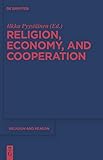Religion, Economy, and Cooperation / ed. by Ilkka Pyysiäinen.
Material type: TextSeries: Religion and Reason : Theory in the Study of Religion ; 49Publisher: Berlin ; Boston : De Gruyter, [2010]Copyright date: ©2010Description: 1 online resource (240 p.)Content type:
TextSeries: Religion and Reason : Theory in the Study of Religion ; 49Publisher: Berlin ; Boston : De Gruyter, [2010]Copyright date: ©2010Description: 1 online resource (240 p.)Content type: - 9783110246322
- 9783110246339
- Cooperation -- Moral and ethical aspects
- Cooperation -- Religious aspects
- Economics -- Moral and ethical aspects
- Economics -- Religious aspects
- Evolution der Kooperation
- Religion
- Theologie
- Theorie der rationalen Entscheidung
- Ökonomie
- SOCIAL SCIENCE / Sociology of Religion
- Economics
- Evolution of Cooperation
- Rational Choice Theory
- Religion
- Theology
- 201/.633 22
- HB72 .R453 2010eb
- online - DeGruyter
- Issued also in print.
| Item type | Current library | Call number | URL | Status | Notes | Barcode | |
|---|---|---|---|---|---|---|---|
 eBook
eBook
|
Biblioteca "Angelicum" Pont. Univ. S.Tommaso d'Aquino Nuvola online | online - DeGruyter (Browse shelf(Opens below)) | Online access | Not for loan (Accesso limitato) | Accesso per gli utenti autorizzati / Access for authorized users | (dgr)9783110246339 |
Frontmatter -- Contents -- Servants of Two Masters: Religion, Economy, and Cooperation -- Religious Culture and Cooperative Prediction under Risk: Perspectives from Social Neuroscience -- Rational Choice Theory and Bounded Rationality -- Playing against Superior Beings in Religion, Technology and Economy -- Durkheim and Psychology -- Religion and the Emergence of the Rule of Law† -- Max Weber Revisited -- The Market, God, and the Ascetic Life -- Backmatter
restricted access online access with authorization star
http://purl.org/coar/access_right/c_16ec
Why give money to beggars? Why make sacrifices to help others? The current volume targets such questions with the tools of neoclassical and behavioural economics, philosophy, and sociology of religion. Both religion and economics are analyzed as social institutions that support human intra-group cooperation. Even if individuals are rational maximizers of personal utility, they yet must take into account the reciprocal nature of human relationships. It is better to be part of a cooperative group and make some personal sacrifices because, in the end, everybody benefits from this. Sometimes the metaphor of an invisible hand is used to describe the fact that economic exchange seems to follow some rules that guarantee the best possible result for everyone. In religion, it is of course the hand of God that guides the world. In both cases, individuals are in a way playing against a superior being that always seems to win. In this volume, some of the cognitive mechanisms and cultural selective forces behind this are examined by specialists in different fields of science. The first contributions analyze theoretical and methodological issues; in later chapters, developments in the European history are explored from the perspectives of sociology and economic theory.
Issued also in print.
Mode of access: Internet via World Wide Web.
In English.
Description based on online resource; title from PDF title page (publisher's Web site, viewed 28. Feb 2023)


